Alice Springs: 129 days a year over 40°C?
6 March 2020
Archived article
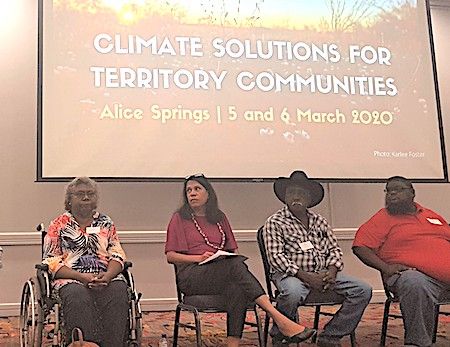 By ERWIN CHLANDA
By ERWIN CHLANDA
Last Christmas people in Tennant Creek were looking at a large thermometer in the street. At 4.22pm “it was sitting at 49 degrees,” said Norman Frank, a Warramunga man from the region.
He was in the air conditioned Grand Ballroom of the Double Tree Hilton Hotel in Alice Springs yesterday, addressing a crowd of 70. They all laughed when he said: “We were waiting for it to tick over to 50.”
Much of the seminar, continuing today, wasn’t a laughing matter: A conglomerate of scientists and activists were dealing with politics, water, fracking and climate change.
In the first session Mr Frank painted a grim picture of how the Barkly had been affected by the drought, at the southern edge of the Beetaloo Basin where the NT Government wants to salvage it catastrophic financial position with fracked gas.
Temperatures over 45 for a month. “No water for four years. Usually birds wake you up. Nothing out there.”
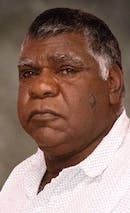 Mr Frank (at right) – surprisingly, given the pro-solar power tenor of the seminar and the $20 billion dollar project’s immense local employment prospects – took aim at the Sun Cable project at Tennant Creek: “It’s in my backyard … sending that power over to Singapore … white man’s rule … we Aborigines never hold the white flag up … the spirit of Ned Kelly is still alive … we keeping fighting.”
Mr Frank (at right) – surprisingly, given the pro-solar power tenor of the seminar and the $20 billion dollar project’s immense local employment prospects – took aim at the Sun Cable project at Tennant Creek: “It’s in my backyard … sending that power over to Singapore … white man’s rule … we Aborigines never hold the white flag up … the spirit of Ned Kelly is still alive … we keeping fighting.”
An obligatory joint venture with Aboriginal interests was mentioned at the conference, as well as an ongoing rent payments and free power to communities from Sun Cable.
The Jesuit Social Services and anti-fracking groups have brought together a rich variety of speakers for this Climate Justice Forum, unsurprisingly not including mining figures nor Labor politicians. In fact no CLP candidates were there either.
Independent candidate for Braitling Scott McConnell attended yesterday.
“My place is right in the middle where they are mining,” said Janet Gregory from Elliott. “People have to start listening to Aboriginal voices.”
She wants people no matter what colour to fight this … each and every person in this country, in the world … stop the harm to the country … corporate greed has to stop.
Ms Gregory wants to start small businesses on remote communities: “Do something on our land … but who do you talk to? The very organisations supposed to help you shut the door on you.”
And that includes the land councils, she said.
Local people have skills, the Barkly soil is rich, but “we can’t do something”.
One exception, clearly, is the Borroloola Project: That community is planning, building and operating a solar electricity project with its own resources and people – no churn, no fly-in-fly-out crews.
The concept of the project dates back six years.
It will be a template for other bush communities, said speaker Alan Langworthy, a private consultant, who outlined how “legacy barriers” can be overcome.
He says there is plenty of money around … private funding and business opportunities … getting returns for capital investors … under normal commercial deals.
The results: Savings in fossil fuel, lower electricity prices, even for people in houses without solar panels, courtesy a pricing scheme created by Jacana.
However, the NT Government owned electricity system was attacked by speakers on several occasions as an impediment to solar power development.
There is a dual system: Territory Generation powers the major population centres, while Indigenous Essential Services runs the power houses in the bush.
For example, private home owners can sell power they generate into the grid seven days a week, but commercial promises – hotels, supermarkets and so on, can’t on the weekend. (The Alice Springs News will seek an explanation for that.)
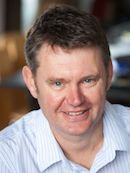 Mark Ogge (at left), from the Australia Institute, said temperatures of over 40°C in Alice Springs could increase from 14 days per year historically, to up to 52 days per year by 2030 and up to 129 days a year in the lifetime of today’s residents, if greenhouse gas emissions continue to climb.
Mark Ogge (at left), from the Australia Institute, said temperatures of over 40°C in Alice Springs could increase from 14 days per year historically, to up to 52 days per year by 2030 and up to 129 days a year in the lifetime of today’s residents, if greenhouse gas emissions continue to climb.
This could be avoided if emissions are reduced fast enough to keep warming below 1.5°C.
On the other hand, the worst case scenario will become more likely by policies to open up vast new sources greenhouse gas such as Beetaloo Basin shale gas.
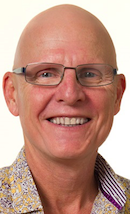 John Boffa (at right), the Chief Medical officer of Congress, told the seminar that a flow in the usually dry Finke used to result in big fish populations in the river. That is no longer the case.
John Boffa (at right), the Chief Medical officer of Congress, told the seminar that a flow in the usually dry Finke used to result in big fish populations in the river. That is no longer the case.
Climate change, a result of social and economic conditions, is making it easier for diseases to cross from animals to humans, and heat is a massive cause of death, he said.
Kirsty Howey, from the North Australia Research Unit, commented on the dual systems of government water management – including Darwin, Alice, Katherine and Tennant Creek on the one hand, and the remote communities on the other, and the effects of that: Who is legally accountable for what?
Tess Lea, from the University of Sydney, posed the question: “Can there be good policy?”
She answered it: “Yes, it’s not rocket science, but why is it so hard?”
The economy and Jukurrpa are clashing because our extractive industries are “for benefit of a few pockets” and using fossil fuel is entrenched in our way of living.
The answer is clear: No more water theft, stop fracking, simply stop it. But who will make that happen?
Lives are going to get harder. Some areas will be unlivable, because there is no water, or because sea levels will rise.
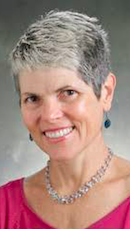 In some parts of Australia there will be periods of the year over 50 degrees, some in Queensland over 60 degrees, said Professor Lea (at left).
In some parts of Australia there will be periods of the year over 50 degrees, some in Queensland over 60 degrees, said Professor Lea (at left).
Aboriginal people need to be involved in the planning, not only of their own communities but of the cities as well: The bush is their hinterland, that’s where climate refugees will come from.
There needs to be a serious re-invention of how we live as collectives, and that will need to deal with “hyper incarceration systems and increasing policing power.
“Are jails the only way to manage people? There is a ton of work in there. We just have to get into it,” said Prof Lea.
Why would climate change refugees need to move to a city, asked a woman in the audience.
Answered Prof Lea: The alternative is living off grid, having no access to medicine, no services, trapped in zones of abandonment, in poverty and dying slowly.
The News will report in more detail about some of the talks in the next few days.
PHOTO AT TOP, FROM LEFT: Janet Gregory, Dr Josie Douglas, Frank Shadforth, owner of Seven Emu Cattle Station and conservation reserve, Gadrian Hoosan from Borroloola solar project.
UPDATE 1.40pm
The episode with the street clock was in Tennant Creek, not Elliott. We corrected the text.
UPDATE 3.50pm
We have changed “the project is now six years in the making” to “the concept of the project dates back six years.”
UPDATE March 9
Speaker Janet Gregory was referred to as “Anna”. We have corrected that error.



We can’t get more hot days without more sun. Which we can’t because the planet tilts on its axis, hence the 20° cooling every year for winter.
I was speaking to a fellow from a pro climate change group, he said:”We better not have daylight saving here in Central Australia, we will be up to 60 degrees each day with that extra hour of sunlight.”
This fellow was dead serious. And another said: “Global warming has already faded my lounge room curtains.”
What happened to the hole on the ozone? Or did it happen but we do not know we have been sucked out into the universe and spinning around the sun in another axis?
Please we need some facts which are not forthcoming just a lot of hot air in my opinion.